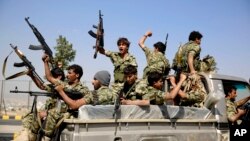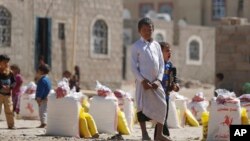U.N. sponsored peace talks on Yemen have wrapped up after six days because of frequent violations of a cease-fire agreement by the warring parties. Airstrikes by the Saudi-led coalition and fighting by Houthi rebels have continued throughout the negotiations, reportedly killing more than 75 people over the past three days.
U.N. envoy Ismail Ould Cheikh Ahmed said cessation of hostilities is central to the success of the talks. So, he said he had no choice but to suspend them for now.
“It is very clear that, unfortunately, the cease-fire that was agreed upon, as I said earlier, wasn’t respected and, in some cases, was violated from the first hours even of these talks. Therefore, we will aim, as I said, in the coming days to make every single effort to ensure that a new cease-fire is put in place," Ahmed said.
The pro-government and Houthi rebel delegations have been sequestered since Tuesday in the Swiss mountain town of Magglingen. The U.N. envoy hoped to enhance the peace process by preventing the warring parties from negotiating before the world media by blaming each other for prolonging the civil war.
Some progress
Despite this setback, Ahmed said the pro-government and rebel delegations were able to make some progress. He said they have agreed upon a package of confidence building measures. These include the eventual release of all prisoners and a call for the safe, rapid, and unhindered delivery of humanitarian aid to conflict-affected areas, especially to the besieged city of Taiz.
“The participants likewise agreed to a negotiating framework for a comprehensive agreement to end the conflict and allow the resumption of inclusive political dialogue… To continue the work of the Coordination and De-escalation Committee… The Committee will be comprised of military representatives of the parties who will meet under U.N. facilitation,” Ahmed said.
The special U.N. envoy said he will continue to work with the parties to identify and implement confidence-building measures. He said he will hold bi-lateral meetings with the parties to assure their commitment to a more durable cease-fire.
The talks are set to reconvene in mid-January.
Yemen's current crisis erupted in September 2014 when Houthi rebels seized the capital, Sana'a, forcing President Abdu Rabu Mansour Hadi's government to flee first to the southern port of Aden - and then exile in Saudi Arabia after the rebels took over the port.
Yemeni forces, backed by Saudi-led airstrikes, have since retaken Aden, but Yemen's capital is still under rebel control.
The airstrikes and fighting on the ground have killed close to 6,000 people and created a severe humanitarian disaster in Yemen. U.N. experts say close to 80 percent of the population is in dire need of food and basic health care.






